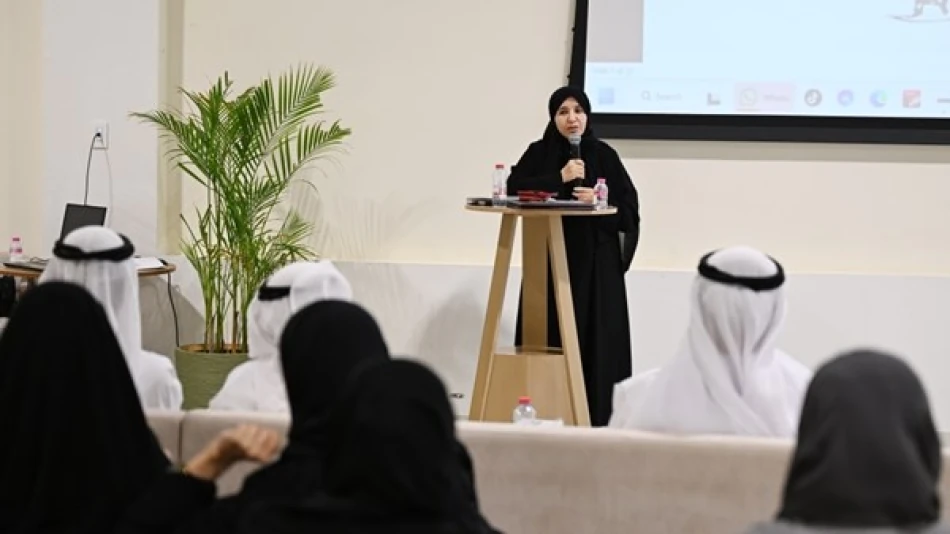
Self-Immunity Association Celebrates World Humanitarian Day
UAE Autoimmune Society Expands Humanitarian Reach Through Multi-Sector Health Partnerships
The UAE's Autoimmune Society has leveraged World Humanitarian Day to forge strategic alliances with government health agencies and specialized medical programs, signaling a coordinated national approach to addressing immune system disorders. The August 19th event, backed by the Ministry of Health and Prevention, demonstrates how the Emirates is positioning patient advocacy organizations as central players in its broader healthcare ecosystem.
Strategic Alliance Building in Healthcare
Dr. Iman Al Hashemi, founder and chairman of the Autoimmune Society's board, emphasized that the organization's humanitarian work extends beyond traditional patient support. The society has partnered with the Bahr Al Thaqafa Foundation, the national "Hayat" organ transplant program, and the UAE Cancer Society to create what amounts to a healthcare advocacy network.
This multi-institutional approach reflects the UAE's broader strategy of creating interconnected health initiatives that can share resources and expertise. Rather than operating in silos, these organizations are pooling their capabilities to address complex medical challenges that often overlap in patient populations.
National Organ Transplant Program Shows Results
Dr. Ali Al Obaidli, chairman of the National Organ Transplant Committee, highlighted the success of the "Hayat" program, which has evolved from a government initiative into a community-supported movement. The program's integration with autoimmune disease advocacy is particularly strategic, given that immune system disorders can both necessitate organ transplants and complicate transplant procedures.
The program benefits from what Al Obaidli describes as "unlimited support" from UAE leadership, a factor that has accelerated its implementation compared to organ donation programs in other countries where bureaucratic obstacles often slow progress. This top-down backing allows for rapid policy adjustments and resource allocation.
Prevention and Early Intervention Focus
The emphasis on preventing organ failure through early disease management represents a shift from reactive to proactive healthcare policy. By educating the public about autoimmune conditions that can lead to organ damage, the UAE is attempting to reduce the future burden on its transplant system while improving patient outcomes.
Scaling Community Outreach Operations
Susan Abu Arab, administrative coordinator at the Autoimmune Society, revealed that the organization has conducted over 150 awareness workshops across different community segments. This scale of operation indicates significant funding and organizational capacity, likely supported by the UAE's broader investment in healthcare infrastructure.
The society's expansion into therapeutic interventions—including music and writing therapy programs—suggests it's moving beyond traditional patient education into comprehensive care support. These alternative therapy approaches align with global trends in holistic healthcare but are being implemented with characteristic UAE efficiency and scale.
Volunteer-Driven Model
The organization's reliance on volunteer staff, including medical professionals like Dr. Mozah Al Mazrouei, reflects a mature civil society structure that can mobilize professional expertise for public benefit. This volunteer model allows the society to expand its reach without proportional increases in operational costs.
Implications for Regional Healthcare Development
The UAE's approach to autoimmune disease advocacy—integrating it with organ transplantation, cancer care, and cultural organizations—could serve as a model for other Gulf states developing their healthcare systems. The emphasis on cross-sector collaboration and government backing provides a framework that smaller healthcare systems could adapt.
For international medical organizations and pharmaceutical companies focused on autoimmune treatments, the UAE's coordinated approach represents both an opportunity and a more complex regulatory environment. Companies will need to engage with multiple stakeholders rather than individual institutions, but the potential for broader implementation of successful programs is correspondingly greater.
The integration of humanitarian messaging with practical healthcare delivery also positions the UAE as a regional leader in medical diplomacy, potentially attracting medical tourism and international partnerships in specialized care areas.
Most Viewed News

 Layla Al Mansoori
Layla Al Mansoori






